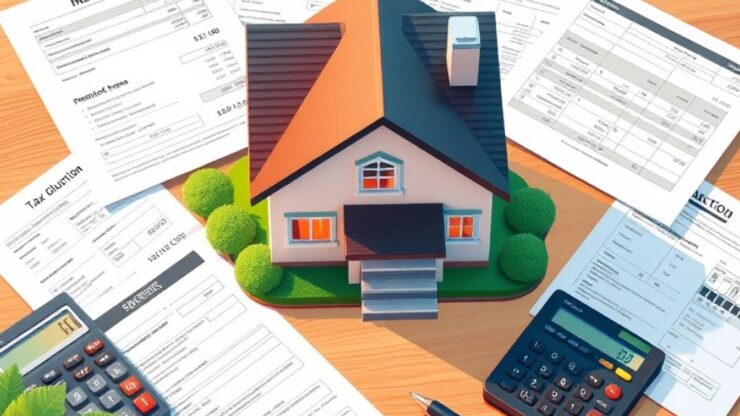Overview of Property Tax Deductions
Property taxes can be a significant financial burden for homeowners. Fortunately, many jurisdictions offer various deductions that can alleviate some of this financial pressure. Understanding these deductions is crucial for homeowners and real estate investors alike to maximize their financial benefits. This overview will delve into the intricacies of property tax deductions, highlighting eligibility criteria, common deductions, and strategic considerations.
Not all property tax deductions are created equal. They can vary widely depending on local laws and individual circumstances. Here, we outline some of the most common deductions that homeowners may qualify for:
- Homestead Exemption: A reduction in property taxes for primary residences, often aimed at helping low-income homeowners.
- Senior Citizen Exemption: Many states offer additional deductions or exemptions for seniors, acknowledging their fixed income status.
- Disability Exemption: Homeowners with disabilities may qualify for certain tax relief programs designed to lessen their financial burden.
- Veteran Exemptions: Many states provide tax relief for veterans, including those who are disabled due to service-related injuries.
- Local and State-Specific Deductions: Some jurisdictions offer unique deductions based on specific local needs or policies.
To fully benefit from available property tax deductions, homeowners should consider several factors that can influence their eligibility and the amount of the deduction:
- Eligibility Criteria: Always check the specific eligibility requirements for each deduction, as they can change yearly and may have strict qualifications.
- Filing Deadlines: Be aware of deadlines for applying for deductions. Missing these dates can lead to forfeiting potential savings.
- Consultation with Professionals: Engaging with tax professionals or financial advisors can provide valuable insights and ensure compliance with local tax codes.
Limitations on Property Tax Deductions

While property tax deductions can significantly ease the financial burden for homeowners, it is crucial to recognize that these deductions come with certain limitations. Understanding these constraints is paramount for homeowners and real estate investors who wish to optimize their tax strategies while remaining compliant with local regulations. This section explores the key limitations associated with property tax deductions, shedding light on how they can impact financial planning.
Many jurisdictions impose limits on the amount of property tax deductions available to homeowners. For instance, the homestead exemption, which offers relief to primary residence owners, may cap the deduction at a specific dollar amount, depending on local regulations. These caps can vary widely across different states, highlighting the importance of checking local laws to determine the exact benefits one can claim. Consequently, homeowners should remain vigilant about these caps, as they can substantially affect the overall savings anticipated from property tax deductions.
Another significant limitation arises from income-based eligibility criteria for various deductions. Many exemptions, such as those for senior citizens or disabled homeowners, often require applicants to meet certain income thresholds. If a homeowner’s income exceeds these limits, they may become ineligible for valuable tax relief. This aspect necessitates careful financial planning and an understanding of one’s current and projected income levels. Additionally, some deductions may require homeowners to provide extensive documentation to prove their eligibility, which can be a daunting task for many.
Property tax laws are not static; they evolve over time in response to economic conditions and policy changes. Homeowners must stay informed about potential legislative changes that could affect their property tax deductions. For example, local governments may decide to modify or eliminate certain deductions during budget shortfalls, which can leave homeowners scrambling for alternative financial solutions. As such, it is advisable for property owners to regularly review their tax situations and consult with tax professionals to adapt to any changes in the law.
Eligibility Criteria for Deductions
Understanding the eligibility criteria for property tax deductions is essential for homeowners aiming to alleviate their financial obligations. Each deduction has specific requirements that must be met, often tailored to support particular demographic groups or financial situations. By familiarizing themselves with these criteria, homeowners can make informed decisions and potentially unlock significant savings on their property taxes.
Many property tax deductions are designed with specific demographics in mind. For example, the Homestead Exemption primarily benefits homeowners who occupy their property as their primary residence, often requiring proof of residency. Similarly, the Senior Citizen Exemption is tailored for elderly homeowners, typically mandating that applicants reach a certain age, often 65 years or older. Additionally, income restrictions are common, ensuring that these deductions provide relief to those who need it most. Homeowners must verify their eligibility by providing relevant documentation, such as tax returns or proof of age, to qualify for these exemptions.
Another critical aspect of eligibility revolves around income and asset limitations. Many jurisdictions impose caps on qualifying income levels, which can disqualify homeowners whose earnings exceed certain thresholds. For instance, the Disability Exemption often requires applicants to provide evidence of their disability status and demonstrate that their income is below a specified limit. Furthermore, some programs may evaluate the homeowner’s total assets, meaning that even high-value properties may not qualify if the owner has significant additional wealth. Being aware of these limitations not only helps homeowners determine their eligibility but also encourages proactive financial planning.
Proper documentation plays a pivotal role in the eligibility process for property tax deductions. Homeowners must be prepared to submit a variety of documents, including identification, proof of income, and any relevant medical or legal records, depending on the nature of the deduction. Moreover, compliance with local regulations is paramount; homeowners must stay updated on any changes to the eligibility requirements that may arise due to legislative updates or policy shifts. By remaining proactive and organized, homeowners can ensure they are well-prepared when applying for property tax deductions, maximizing their chances of success.
State-Specific Variances in Property Tax Deductions
When navigating the complex landscape of property tax deductions, one must recognize the significant variances that exist from state to state. These differences can greatly impact the financial relief available to homeowners and real estate investors. By understanding these state-specific rules and exemptions, individuals can make informed decisions that optimize their tax obligations and maximize their potential savings.
Each state has its own set of laws governing property taxes, which means that deductions and exemptions can differ greatly depending on local regulations. For instance, while some states may provide generous homestead exemptions, others may impose stricter income limits or specific requirements that must be met to qualify. This diversity in tax policy is crucial for homeowners to understand, as it can significantly affect their financial planning.
To illustrate the disparities among various states, we can categorize some of the most notable property tax deductions currently available:
- California: Offers a significant property tax exemption for disabled veterans and their surviving spouses.
- Florida: Features a robust homestead exemption, allowing homeowners to reduce the taxable value of their primary residence.
- New York: Provides a School Tax Relief (STAR) exemption that benefits low- and middle-income homeowners.
- Texas: Offers an array of exemptions, including those for seniors and individuals with disabilities, often with no income cap.
For a clearer understanding of how different states approach property tax deductions, the following table highlights selected states along with their specific deduction offerings:
| State | Homestead Exemption | Senior Citizen Exemption | Disability Exemption |
|---|---|---|---|
| California | Yes, limited | Yes, income-based | Yes, for disabled veterans |
| Florida | Yes, generous | Yes, additional benefits | Yes, no income cap |
| New York | Yes, with STAR | Yes, income-based | Yes, specific criteria |
| Texas | Yes, broad | Yes, significant | Yes, no income cap |
As illustrated, states vary not only in the types of deductions they offer but also in the criteria that homeowners must meet to qualify for these benefits. This variability emphasizes the importance of understanding local regulations and staying informed about potential changes that could affect tax liability.
Impact of Property Tax Deductions on Homeowners
Property tax deductions can significantly influence the financial landscape for homeowners, offering a potential lifeline in managing the often burdensome costs associated with property ownership. These deductions not only provide immediate monetary relief but also contribute to long-term financial stability and investment opportunities. Understanding how these deductions impact homeowners can empower them to take full advantage of available benefits, ultimately enhancing their quality of life.
One of the most notable impacts of property tax deductions is the immediate financial relief they provide, enabling homeowners to allocate funds towards other essential expenses. By reducing the taxable value of their properties, homeowners can lower their overall tax liability, which often results in more disposable income. This increase in financial flexibility can lead to several positive outcomes:
- Increased Savings: Homeowners can redirect the savings from property tax deductions into savings accounts, retirement funds, or emergency reserves, fostering financial security.
- Improved Quality of Life: With lower property taxes, families can afford better housing conditions, invest in education, or even enjoy leisure activities that enhance their overall well-being.
- Investment in Home Improvements: Homeowners may choose to reinvest their tax savings back into their properties, leading to increased property values and enhanced living spaces.
Beyond immediate financial relief, property tax deductions can contribute to long-term stability for homeowners. By reducing their overall tax burden, homeowners may be more inclined to invest in real estate, which can serve as a means of wealth accumulation. Additionally, understanding the intricacies of property tax deductions can empower homeowners to make informed decisions about their real estate investments.
For instance, homeowners who are aware of the available deductions are better equipped to:
- Plan for Future Purchases: Knowledge of tax benefits can guide homeowners in making strategic decisions regarding upgrading to larger properties or investing in rental properties.
- Maximize Equity Growth: By minimizing tax expenditures, homeowners can accelerate the pace at which they build equity in their properties, thus improving their financial standing.
In conclusion, the impact of property tax deductions on homeowners extends far beyond immediate savings. These deductions foster a supportive environment that encourages financial planning, home investment, and improved living conditions, ultimately allowing homeowners to thrive.
Disclaimer
This article has been created or edited with the support of artificial intelligence and is for informational purposes only. The information provided should not be considered investment advice. Please seek the support of a professional advisor before making any investment decisions.






